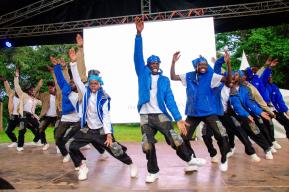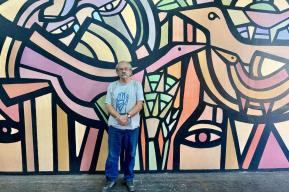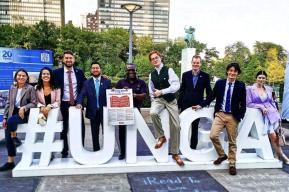Katherine Vergara's interest in science began at a young age when she lived in the north of Chile and analysed the objects around her.
Later, in her teens, her passion for video games led her to become interested in the world of computing, and particularly, in how physical things could interact with the virtual world. For that reason, she currently works researching the link between humans and computers. Specifically, the relationship and attitude of girls towards technology, mediated by physical computing. Her efforts bore fruit when she won the L’Oréal-Chile UNESCO “For Women in Science” award, in the PhD category.
On the International Day of Women and Girls in Science (11 February), Katherine shares her journey and explains what is needed to involve more young people like her in the fields of science, technology, engineering, and mathematics (STEM).
What challenges did you face on your path to fulfilling your scientific vocation?
My path to science was not easy. In my childhood, I faced learning challenges and struggled particularly with writing, which made me doubt my academic abilities and my capacity to achieve something when I was older. These insecurities led me to misbehave in school, so I had to change schools multiple times. However, the support of an understanding teacher and the determination to overcome my difficulties helped me to persevere and finally be drawn to pursue my scientific dreams.
What would need to change in order for more girls and women to choose STEM careers?
I believe it is essential to stimulate girls' interest and confidence in STEM areas from an early age. This involves providing female role models in these fields and developing inclusive educational programmes that engage them in STEM activities (…). These programmes must take into account the specific socio-emotional needs of girls, considering not just gender stereotypes but also other aspects, such as their socio-economic background, geographical location, and culture, to ensure their effectiveness.
What would be an ideal scenario for you to have more female scientists in Chile?
An ideal scenario would be one in which women have equal opportunities and access to resources in the STEM field. This includes policies that promote gender equity in education and employment, as well as initiatives that encourage mentoring and professional support for female scientists, since many women leave the scientific career due to a lack of support and the feeling of isolation in predominantly male areas. Additionally, it is crucial to ensure access to funding for women-led research, as research is a process that requires significant economic resources.
What advice would you give to girls and women who want to dedicate themselves to Science?
My path has not been a straight line to the world of science, and I like to share this story with girls, so they see that a great scientist can come from anywhere, no matter their socio-economic, geographical context, or even their previous educational trajectory. If you have an interest in science and the desire to contribute to knowledge, it's never too late to chase your dreams. Look for mentors, build support networks, and never stop learning and growing.
What can you tell us about the research that earned you the L'Oréal Chile-UNESCO recognition? How did you feel upon receiving this award?
Receiving the L'Oréal Chile-UNESCO recognition was an honour, as it validates the work I am carrying out to encourage girls' participation in STEM. This award motivates me to continue and to keep contributing to the advancement of science and gender equity in this field. However, the most significant has been the impact it has had on women and girls who have approached me as a result of this award. I believe it is very important for them to have female role models in science, especially in computer science, where there are few researchers.
This award has given me the opportunity to share my story with them and debunk some misconceptions, such as the idea that computing is a lonely or uncreative discipline. Moreover, I want to highlight that this award is also for my doctoral team, who have been a fundamental pillar in this process. I am infinitely grateful for their support and commitment, including my university professors, who have always encouraged me to give my best and have provided me with invaluable guidance and support throughout my academic journey. Without them, this achievement would not have been possible.









